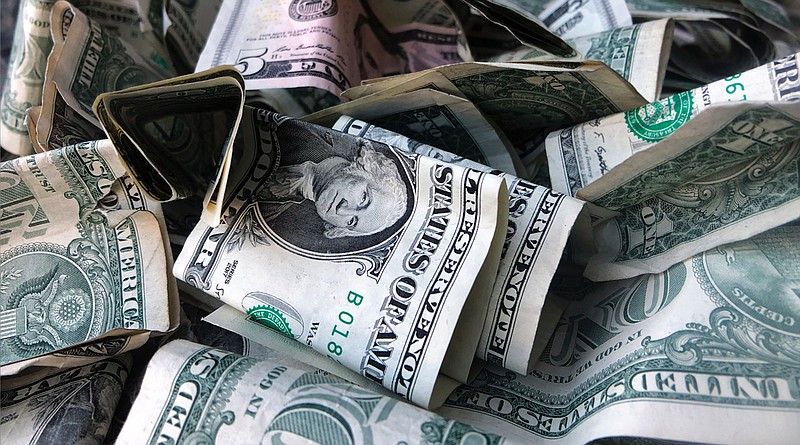I’m writing this between my daughter’s diaper changes, bottle breaks and naps, as well as my own weepy fits of anxiety and despair. Our day care closed because of a covid-19 case, so our baby gets to gurgle at my husband and me as we stare at our computers — tense shoulders at ears — and attempt to work.
The very last thing I want to do is think about my finances.
I’m sure I’m not alone. Money is a major source of stress for many people, and who needs more stress right now? After nearly a year of the pandemic, you may already be wading through desperation, loneliness, grief, exhaustion or, of course, fear.
“The stress is compounded by the fact that you might actually die,” says Brad Klontz, certified financial planner, psychologist and author of “Money Mammoth.”
“A ridiculous amount of stressors has fallen on everybody.”
Cue good old avoidance. That’s my go-to — just don’t deal with the thing that’s making you pull out your hair. But avoiding money problems makes them worse. And if you’re like the many, many people who’ve taken a financial hit, you can’t afford to let your situation get much worse.
TALK IT OUT
Now that we’re all thoroughly depressed, here’s a gentle reminder from Klontz: “You might feel alone, but you’re not.” In fact, he adds, “chances are your friends are sitting there feeling exactly the same way.”
So reach out to a trusted friend or family member about what’s stressing you out. You might not get solutions, but you’ll likely feel better after venting and getting some commiseration. And your friend might be grateful to learn that you’re open to talking about money troubles — they could be weighing on them, too.
To keep each other safe, you’ll probably have to jump on the phone or a video call, or bundle up for a February stroll. But try it anyway. “In the midst of stress, the worst thing you can possibly do is socially isolate,” Klontz says. “That is a recipe for depression.”
LIST NOW, HANDLE LATER
To start fixing money problems, you first have to face them — but not all at once and right this second. That’s a reminder for those who obsess rather than avoid.
“There are two ways people handle their money in extreme situations,” says certified financial planner Pamela Capalad. “It’s either all they think about and look at, or they completely ignore it and hope it works out.”
Whatever your tendency is, consider keeping a financial task list. “If there’s a place you can park all this stuff and know that you’re going to take care of it later, that will help prevent future burnout,” says Capalad, who’s also the founder of the financial planning business Brunch & Budget.
GO ON A ‘MONEY DATE’
Now for that whole “take care of it later” thing. Capalad recommends scheduling a “money date” with yourself. Plan a specific date and time when you can fochttps://www.arkansasonline.com/admin/news/story/1412261/#us, and choose a room that you don’t usually work in, if possible. It’s fine to keep the date short. If you can only think about money for 20 minutes before feeling anxious, then stick to 20 minutes.
Go into your date focused on what you want to do. If you have only 20 minutes, don’t try to dive into your whole financial history.
“Just look at the thing that’s been simmering in the back of your head,” Capalad says. Maybe you finally peek at that credit card debt and brainstorm ways to chip away at it. Or perhaps you list all your bills, their due dates and how to pay them — or catch up. (You could learn that you should try to lower your bills.)
If no one thing is nagging you, consult your task list. Or review bank and credit card statements to learn how much you’re spending on what, and how those expenses compare to your income. Over time, a few 20-minute reviews of your cash flow might help you feel more comfortable thinking about money and less likely to avoid it.
BE KIND TO YOURSELF
If you don’t like what you find on your money date, don’t beat yourself up. After all, you faced something you didn’t want to see — and you did it at a time when everything was extra hard.
“We all need to give ourselves a little bit of grace,” Capalad says, adding that clinging to pre-pandemic standards can lead to burnout. Just as you should forgive yourself for not being the fittest, happiest, most productive person during a horrifying global crisis, cut yourself some slack for not being totally on top of your money.
Maybe you have to dip into savings or ask your credit card issuer for help because you can’t make payments. Yes, that’s really awful. But you’ll likely be able to rebuild, Capalad says.
“You may be living in the worst-case scenario right now, but all of this stuff can be fixed,” she says. “It’s OK if your credit score drops from a 700 to 600 because of a global pandemic.”
This column was provided to The Associated Press by the personal finance website NerdWallet.
